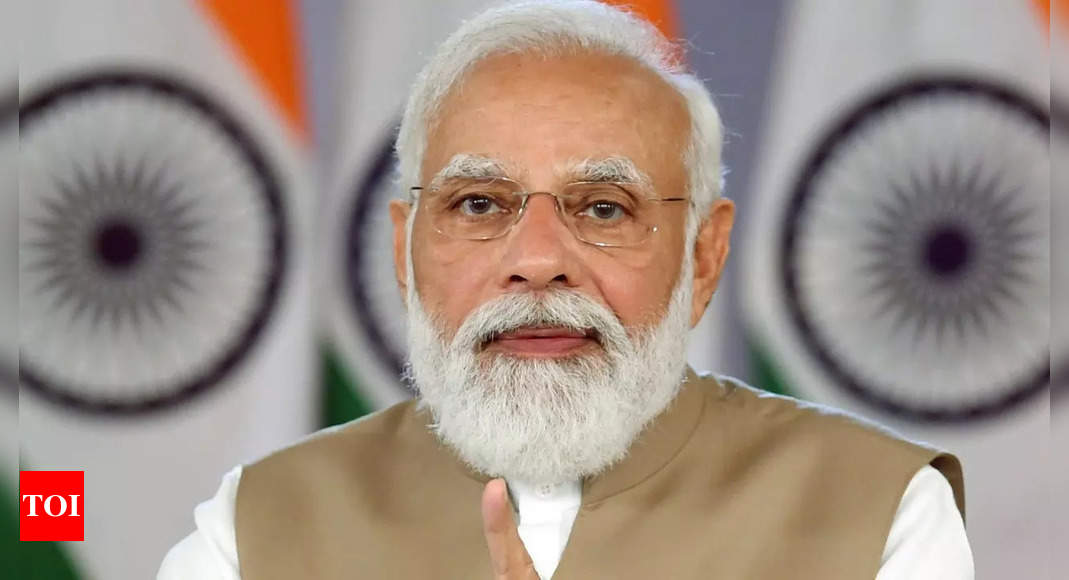


In a special episode of his popular radio broadcast 'Mann ki Baat,' Prime Minister Narendra Modi wished all Indians a happy Republic Day in advance and paid tribute to the country's great leaders for their contributions. He emphasized the importance of unity and cooperation as stressed by Dr B.R. Ambedkar during the Constituent Assembly's work and highlighted India's rich history and culture as a symbol of its commitment to human values. The Prime Minister urged citizens to take inspiration from the ideas of the country's Constitution makers and work towards building a strong and proud India.
In an extraordinary episode of his renowned radio broadcast 'Mann Ki Baat,' Prime Minister Narendra Modi bestowed warm Republic Day greetings to all Indians on the eve of the national celebration. He paid glowing tributes to India's eminent leaders, acknowledging their invaluable contributions to the nation.
Emphasizing Unity and Cooperation
Drawing inspiration from the words of the esteemed Dr. B.R. Ambedkar, the Prime Minister underscored the paramount importance of unity and cooperation. He reiterated the principles enshrined in the Constitution, which prioritize the welfare of all citizens and foster a sense of inclusivity.
Celebrating India's Rich Heritage
Prime Minister Modi highlighted India's diverse and vibrant history, history, and culture as a testament to the country's profound commitment to human values. He emphasized the significance of embracing our heritage and preserving traditions while also striving for progress.
Building a Strong and Proud India
The Prime Minister urged citizens to draw inspiration from the visionary ideas of the architects of the Indian Constitution. He encouraged Indians to work collectively towards building a strong, prosperous, and self-reliant India, a nation that stands tall with pride on the world stage.
1. When is the next episode of 'Mann Ki Baat'? The Prime Minister's next 'Mann Ki Baat' broadcast is scheduled for the last Sunday of every month.
2. How can I listen to 'Mann Ki Baat'? The broadcast is available live on All India Radio (AIR) and Doordarshan, as well as on the official website of the Prime Minister's Office (PMO).
3. What are the main themes of 'Mann ki Baat'? The Prime Minister typically covers a wide range of topics in his broadcasts, including current events, social issues, nation-building initiatives, and messages of inspiration.
4. How can I share my feedback on 'Mann Ki Baat'? Citizens can share their feedback and suggestions for future episodes through the MyGov platform.
5. When was the first episode of 'Mann Ki Baat' aired? The first episode of 'Mann Ki Baat' aired on October 3, 2014, and has since become a popular platform for the Prime Minister to engage directly with the nation.

During a public meeting in Bihar, Union Home Minister Amit Shah dismissed any speculation about leadership changes by firmly stating that there is "no seat vacant" in politics. Praising Chief Minister Nitish Kumar and Prime Minister Narendra Modi, Shah urged the people of Bihar to vote for the NDA in the upcoming assembly elections. He also addressed various issues such as the construction of the Ram Temple and the ban on PFI, while emphasizing the NDA's strong leadership in the state.

Union Home Minister Amit Shah expressed his confidence that the BJP will emerge victorious in the upcoming assembly elections in West Bengal. He also criticized Chief Minister Mamata Banerjee and the ruling TMC for their opposition towards the special revision exercise for the voter list. The minister defended the legitimacy of the process and supported the Election Commission, while the opposition claims it is a ploy to manipulate voter lists before the polls.

Union Home Minister Amit Shah criticised the opposition's manifesto promise of providing government jobs in Bihar if they come into power. Calling it "nonsensical", Shah stated that such a promise is absurd and the opposition knows they will never come to power and will not have to fulfil any promises made. He also pointed out that the opposition's manifesto ignores the development strides made in Bihar, such as electricity and clean water reaching every village.

In an exclusive interview with News18 India, Union Home Minister Amit Shah dismissed Rahul Gandhi's allegations of "vote chori" (vote theft) and assured the people of Bihar that the BJP will take action against every single infiltrator in the country. He also addressed concerns about Nitish Kumar's health and stated that the Bihar CM was holding four rallies a day, proving that there was no question of his health being in poor shape. Additionally, Shah criticized the opposition's attempt to create a negative perception about Nitish Kumar.

In a recent interview with News18 India's "Sabse Bada Dangal Bihar 2025", Union Home Minister Amit Shah confidently stated that the NDA will form a government with an unprecedented two-thirds majority in the upcoming Bihar assembly elections. Shah also vehemently denied any concerns raised by the opposition regarding the health of Chief Minister Nitish Kumar, stating that both he and Kumar are holding four rallies a day. This marks a major shift in the political equation in Bihar, as the BJP and JD(U) are contesting an equal number of seats, a first in the state's electoral history.

PM Modi delivered a speech at the Maritime Leaders' Conclave in Mumbai, praising the government's efforts in revolutionizing and modernizing the country's shipping sector. He emphasized the nation's ports as being among the most efficient in the developing world, declaring that India has made significant progress in this area.

Union Minister Dharmendra Pradhan, who is also the BJP's in-charge for the Bihar polls, has strongly criticized Congress leader Rahul Gandhi for his derogatory comments against PM Modi. Pradhan has demanded a public apology from Gandhi for his remarks, stating that they are against basic norms of public discourse. He further added that this reflects the Congress' deep-rooted resentment and frustration towards PM Modi and his leadership. Meanwhile, Rahul Gandhi has kicked off his poll campaign in Bihar with a scathing attack on PM Modi, accusing him of "enacting all types of drama" for votes and running the state through remote control.

Elon Musk's xAI has launched Grokipedia, an AI-powered online encyclopedia to rival Wikipedia. Musk aims for the platform to be a "massive improvement" and free from any political bias. While Grokipedia currently sources content from Wikipedia, Musk plans to have all original content by the end of the year. This development adds to Bihar's political landscape, where leaders like Lalu Prasad and Nitish Kumar have dominated with their OBC politics, while Nitish's developmental narrative has transformed the state's political landscape.

BJP leader Chandrashekhar Bawankule sparked controversy with his statement that party workers' phones and WhatsApp groups are being monitored ahead of local body elections. Shiv Sena leader Sanjay Raut demanded his arrest, alleging that the phones of several Opposition leaders were also tapped. Bawankule clarified his statement, but the Sena leader questioned the involvement of BJP offices and technology networks, calling it a potentially anti-national act.

The Election Commission (EC) has announced the schedule for Special Summary Revision (SIR) of electoral rolls in 12 states and Union Territories (UTs) for the year 2025, excluding Assam due to the ongoing National Register of Citizens (NRC) process. While the BJP has welcomed the announcement, the Congress has raised concerns and questioned the decision. The Chief Election Commissioner (CEC) has stated that Assam has a separate provision in citizenship laws and the NRC process must be taken into consideration, causing potential delays in the SIR preparations. Despite the physical closure of banks in Ranchi and Patna, financial services will remain available through digital and self-service platforms, so customers are advised to use online banking and plan any in-branch visits accordingly.